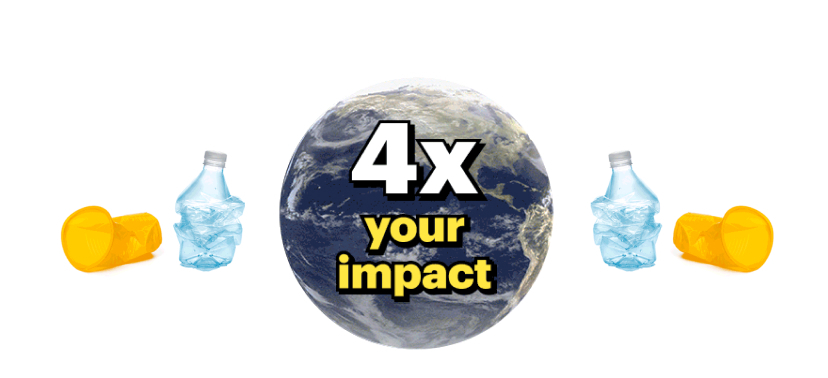ClimateNews & Opinion
by Mia DiFelice
A record-breaking summer of heat waves, wildfires, floods, and other disasters has underscored our urgent need for climate action. But rather than make the changes we need, Big Oil and Gas are pushing technology that will prolong the status quo. To add insult to injury, the industry will spend billions of our taxpayer dollars and endanger our health and safety in the process.
Carbon capture and storage technology aims to take carbon emissions from polluting industries or out of the air itself and store them deep underground. We know this is a climate scam, yet boosters are cynically pushing it as a climate “savior.” They know it will allow them to pollute our planet for decades to come.
Big Ag is in on it, too. It’s proposed thousands of miles of pipelines carrying captured carbon. These pipelines would cut through farms and rural communities to prop up the ethanol industry.
We can’t let them get away with it. The safety of our communities and the future of our planet depends on it. So for the past year, Food & Water Action has mobilized around this issue. We’re calling on Congress to oppose carbon capture funding, and we’re urging President Biden to reverse course and stop supporting Big Oil and Gas’s carbon capture scam.
Big Oil and Gas Has Gathered Support for Carbon Capture
Many of our leaders and lawmakers are following the fossil fuel industry’s lead. In recent decades, they’ve shelled out tens of billions of taxpayer dollars to try and develop carbon capture.
But these efforts have a track record of failure. In fact, carbon capture projects in the U.S. have emitted more climate pollution than they’ve captured. Nevertheless, in the past few years, the federal government has sent billions more in federal subsidies to carbon capture.
To make matters worse, these programs are ripe for fraud. There are few measures to ensure that companies are actually capturing the carbon they claim. And there is overwhelming evidence that they are not. In an especially egregious example, the Department of Energy wasted $300 million on four carbon capture facilities that were never built.
Corporations Are Barreling Forward Despite the Dangers
Not only is carbon capture wasting our money; companies are bowling forward with projects without the safety regulations we need. Now, carbon capture projects and their related infrastructure (including as many as 65,000 miles of new pipelines) threaten communities across the country.
Crucially, U.S. pipeline regulations aren’t strong enough to protect communities from captured carbon dioxide. Accidents, like the 2020 carbon pipeline rupture in Satartia, Mississippi, would be disastrous.
That incident hospitalized dozens of people, many of whom are suffering lasting injuries. Moreover, it showed just how much we don’t know about carbon pipelines, how to prevent accidents, or how to respond to them.
The Pipeline and Hazardous Materials Safety Administration (PHMSA) is drafting regulations for carbon pipelines. However, drafts of these rules likely won’t be released until early next year, and companies are moving fast to avoid tighter regulations.
Congress can strengthen CO2 pipeline rules through the reauthorization of PHMSA, which expired this year. But general dysfunction — including House leadership fights and right-wing extremists calling for government shutdowns — has delayed this. It now looks like PHMSA reauthorization might not happen until sometime next year.
Tell your representative: Protect our communities and stop carbon pipelines!
Our Leaders and Lawmakers Can Help Stop the Buildouts
Big Oil and Gas and its backers are trying to cash in on carbon capture as quickly as possible. We’ve got to slow them down by strengthening the public and political opposition.
That includes engaging with lawmakers to push for stronger rules in the PHMSA reauthorization and pressuring President Biden. With an executive order, he can stop carbon pipelines and infrastructure until PHMSA finalizes its updated safety guidelines.
We’ve joined allied organizations and allies in Congress to gather support for a carbon pipeline moratorium. This fall, we’ve endorsed a letter released by Representatives Ilhan Omar (D-MN), Jesús “Chuy” García (D-IL), and a dozen more Congressmembers calling on President Biden to declare a moratorium.
At the same time, we need to stop the deluge of taxpayer dollars flowing to carbon capture. This issue is even more pressing in light of the current budget battles going on in Congress.
As lawmakers negotiate spending for the coming year, some are suggesting huge cuts to social, health, and environmental programs and agencies. Yet, Congress is willing to send huge giveaways to the fossil fuel industry through carbon capture subsidies.
Our taxes shouldn’t be funding climate scams. They should be supporting the renewable energy transition we need to stave off the worst of the climate crisis.
Join Food & Water Action in Fighting Carbon Capture
Food & Water Action has been working with members and allies to make our demands heard. So far, our volunteers have sent hundreds of calls directly to President Biden, demanding a moratorium on carbon pipelines. We’ve also delivered dozens of letters to representatives, calling on them to stop funding carbon capture and support a moratorium on carbon capture infrastructure like pipelines.
We’ll continue this work until Congress and Biden respond. The urgency of the climate crisis underscores the need for investments in real solutions. That means renewable energy, batteries, and energy efficiency — not Big Oil and Gas’s scams.
We’re gathering a new team of volunteers to build power around the biggest climate issues of our time. From calling on Biden to declare a climate emergency, to stopping carbon capture, you can help us fight for a livable future!

Time to face it~it’s people or plastics.~We can’t have both.
Become a plastic pollution fighter this Earth~Day and have your gift MATCHED $3-to-$1!

